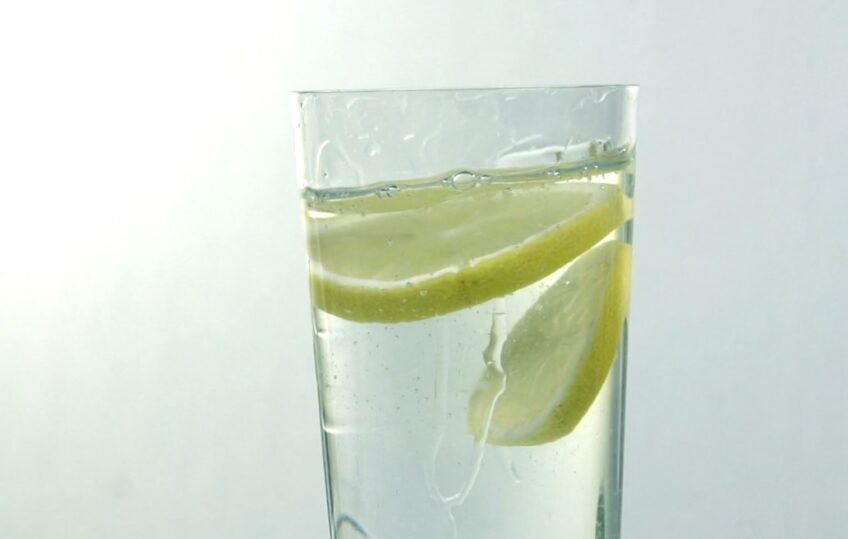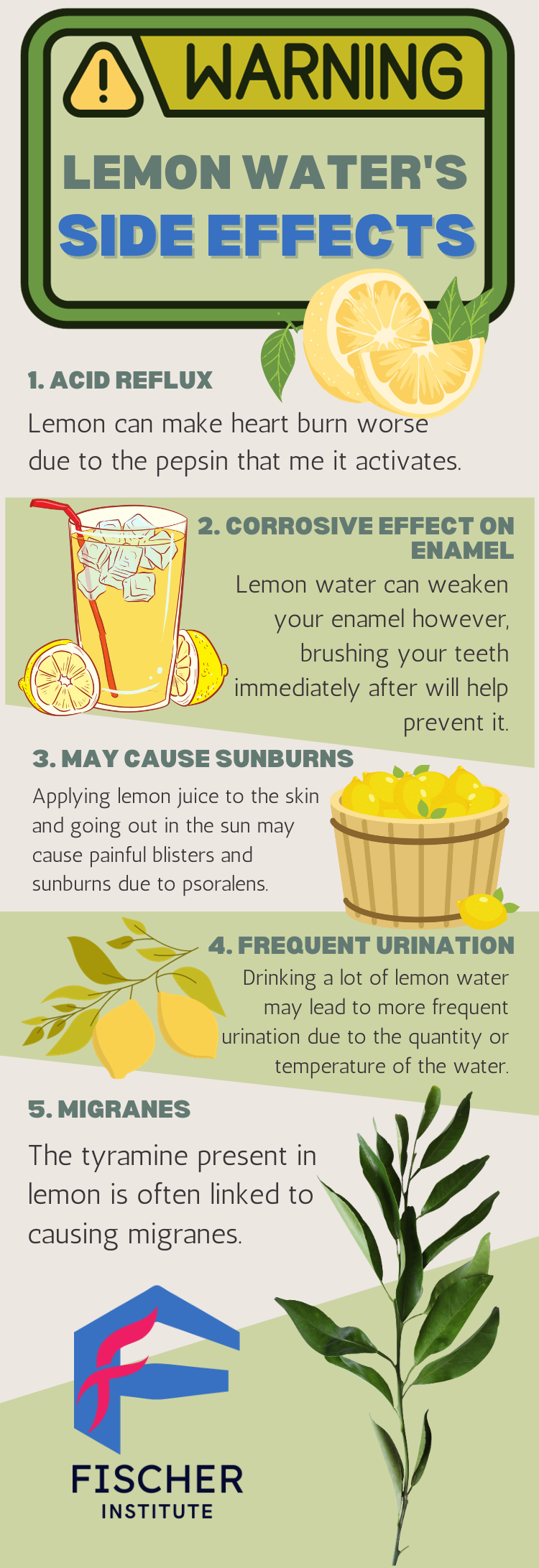
The information presented in the following article has been rigorously reviewed and validated by qualified experts in the field of nutrition and health.
Specifically, the content has been scrutinized by Jovana Srejic Ferluga, a Registered Nutritionist with expertise in weight loss and weight management, Type II Diabetes, and insulin resistance management, as well as communication skills.
Additionally, Dr. Predrag Nenadić, a renowned nutritionist who has obtained his qualifications from prestigious global universities, has also contributed to the review process.
Lemon water is an easy drink made by mixing lemon juice with water. Most people start their day with lemon water daily as it is healthy and refreshing. This study said citrus food drinks, including lemon water, prevent wrinkles.
It can be served cold or warm. It is popular because of its health benefits, including healthy glowing skin, improved immunity, and weight loss (this study). I already write about how to lowering blood pressure naturally with a lemon. And YES, drinking lemon water daily have so so many benefits, you probably know that but…
But have you ever wondered about the disadvantages of drinking lemon water daily?
Page Contents
- 1 How Much Lemon Water Should You Drink in a Day?
- 2 Is Lemon Water Good for You? YES it is!
- 3 Do Lemons Interact With Medications?
- 4 Disadvantages
- 5 What if I need Vitamin C and I won’t use lemon or lemon water?
- 6 FAQ
- 6.1
- 6.2 What are the health benefits of vitamin C?
- 6.3 How much should I consume daily?
- 6.4 Can I get enough vitamin C from my diet alone?
- 6.5 What are the symptoms of vitamin C deficiency?
- 6.6 Can I take vitamin C supplements to boost my intake?
- 6.7 Are there any risks associated with consuming too much?
- 6.8 Can vitamin C help prevent or treat the common cold?
- 7 Final Words
How Much Lemon Water Should You Drink in a Day?
Two glasses of lemon water daily are generally considered safe for most people. To prepare, mix 1 liter of water with 4 slices of lemon.
Lemon water promotes better hydration and can be consumed warmly, with honey, mint leaves, or ginger for added health benefits. Drinking a glass of lemon water early in the morning may help flush toxins from the body.
Keep in mind that factors such as age, health status, and other conditions can affect the recommended daily intake of lemon water. There is no scientific evidence specifying the optimal amount of lemon water to consume each day.
Similarly, for those navigating healthcare decisions, especially seniors, understanding the intricacies of insurance coverage, such as what Medicare offers for dental care, is crucial for making informed choices.
If you choose to consume processed or packaged lemon water products, consult a healthcare professional for guidance.

Is Lemon Water Good for You? YES it is!
The consensus among health professionals is that consuming water is beneficial for health. Infusing your water with lemon might not only enhance its flavor but also provide subtle health advantages, encouraging you to meet your daily water intake.
However, if you’ve been advised by a medical professional to restrict your fluid consumption due to specific health concerns, it’s essential to consult them before incorporating lemon water into your regimen. Conditions like heart failure and kidney disease might necessitate a close watch on your liquid intake.
Nutritional Profile of Lemon Water
The nutritional composition of lemon water can differ based on the type, size, and maturity of the lemon. Typically, a lemon weighing around 65 grams (slightly over 2 ounces) comprises ( study ):
- Water: 57.8 grams
- Calories: 18.8 kcal
- Protein: under 1 gram
- Fat: under 1 gram
- Carbohydrates: 6.06 grams
- Dietary Fiber: 1.82 grams
Pure water has no calories, fats, proteins, or carbs. It serves to mellow the sharpness of lemon juice in the drink. Some individuals also choose to enhance their lemon water with additions like honey, herbs, or spices to modify the flavor and potentially boost its health properties.
Do Lemons Interact With Medications?
Lemons do not generally cause severe interactions with medications. However, our consultant Jovana Srejic Ferluga claims the following:
“There are medications that should not be combined with vitamin C, which is present in lemon.
Some of them are certain types of chemotherapy, medications for HIV infection, statins, barbiturates, tetracycline antibiotics, etc. It is certainly essential to check with your doctor which foods should not be combined with the prescribed therapy.”
Lime juice can affect the rate at which certain medications are broken down, including Triazolam (Halcion), Lovastatin (Mevacor), Itraconazole (Sporanox), Ketoconazole (Nizoral), and Fexofenadine (Allegra). This may result in an increase or decrease in their side effects.
As a precaution, it is advised to consult a physician before consuming lemon or lime juice daily while taking these medications.
Disadvantages
These are some of the disadvantages of drinking lemon water regularly.
- Tooth Damage
- Frequent Urination and Dehydration
- Effects on Bones
- Stomach Upset
- Heartburn
- GERD and Ulcers
- Increased Iron Content
- Migraine Trigger
Dental Erosion

As per a study, lemons are highly acidic, and excessive consumption of lemon water can result in the dissolving of tooth enamel or the outer layer of the teeth, leading to mineral loss.
To quote our expert consultant, Jovana Srejic Ferluga:
“Lemon can damage tooth enamel. Therefore, it is advised to drink a glass of water after you drink squeezed citrus or eat them. Vitamin C tablets should not be chewed. Teeth should not be brushed immediately after contact with any form of vitamin C, but rather after 30 minutes.”
According to the American Dental Association, dental erosion makes teeth more prone to decay over time and can cause sensitivity and pain. A study found that lemon juice can have the same erosive effect on teeth as carbonated beverages.
According to a study, the erosive impact of lemon juice on teeth is equivalent to that of cold drinks.
To minimize the direct contact of lemon water’s acid with your teeth, use a straw. Also, avoid brushing your teeth immediately after drinking lemon water. Instead, consume plenty of plain water alongside lemon water to reduce the risk of sensitivity.
Gastrointestinal Issues and Ulcers
Consuming large amounts of lemon water daily can damage the stomach. Due to its acidity, it can cause heartburn, nausea, and vomiting.
One of the downsides of drinking lemon water daily is that it can trigger the development of ulcers. The acid in lemons can harm the stomach and intestinal lining, leading to ulcers.
If you are already prone to ulcers, it’s best to avoid drinking lemon water daily.
GERD and Acid Reflux
A study found that acidic foods can contribute to gastroesophageal reflux (GERD) and acid reflux. This happens because the acid in lemons irritates the inner lining of the esophagus.
Drinking lemon water on an empty stomach can exacerbate the issue, so those susceptible to acid reflux should refrain from consuming lemon water daily. Acid reflux can result in difficulty swallowing, aggravated asthma, coughing, a sour taste in the mouth, and sleep disturbances if it occurs at night.
Frequent Urination and Dehydration

According to research, lemon water is rich in ascorbic acid or Vitamin C, which has diuretic properties, leading to increased urine production in the kidneys. Along with water, frequent urination can flush out electrolytes from the body, resulting in dehydration, fatigue, dry lips, and excessive thirst.
Additionally, the acidic content of lemon can irritate the bladder, causing a stronger urge to urinate. In such cases, balance lemon water intake under a physician’s guidance.
Exacerbate or Cause Canker Sores
Canker sores are mouth ulcers typically found under the tongue or inside the cheeks. Research suggests that they are caused by acidic or spicy food, vitamin deficiencies, or wearing braces.
According to the American Dental Association, over-consumption of lemon water can worsen existing canker sores. This can make eating and talking uncomfortable. If you notice canker sores after consuming lemon water, consider stopping its consumption.
Trigger Migraines

A downside of daily lemon water intake includes headaches and migraines. Studies show that citrus fruits like lemon can trigger headaches and migraines.
Lemons and other citrus fruits are high in tyramine, which has been linked to migraines and headaches. People with chronic migraines may experience more frequent attacks due to daily lemon water consumption.
Cancer Risk
Citrus fruits like lemons contain psoralens, which are carcinogenic and can cause cancer. One research and study indicates that increased consumption of lemon water (psoralens) can lead to an increased risk of skin cancer, such as melanoma.
In this condition, different sizes and shades of moles appear on the skin, which can even ooze blood but are painless. If you notice such symptoms, consult a doctor.
Negative Impact on Bones
Some researchers suggest that lemon water is connected to bone health. Over time, lemon can reduce the lubricants present between joints and bones.
Excess Iron
Excessive amounts of any mineral in the body can be harmful. A normal iron level is essential for energy production, hemoglobin formation, and the functioning of certain enzymes. Study shows that the vitamin C in lemon water can increase iron absorption.
Our consultant Dr. Predrag Nenadić had this to say:
“This can be beneficial for people with low iron levels but may also lead to hemochromatosis. This condition involves excess iron storage in the body, which can damage organs over time. It can also cause weakness, fatigue, high sugar levels, and skin pigmentation.”
Trigger Sunburn

Lemon and other citrus fruits contain psoralens, a chemical compound that can make skin more sensitive to UV-A rays. Increased light sensitivity of the skin can result in severe sunburn.
It can exacerbate sunburn and cause phytophotodermatitis, a type of skin inflammation due to certain plant-based chemicals that occur when exposed to sunlight. This can lead to:
- Redness
- Pain
- Itching
- Pigmentation
- Blisters
- Burning sensation
If you’re drinking lemon water to fulfill your daily requirement for vitamin C, you can switch to many other foods that are loaded with vitamin C.
Also Important:
In a comprehensive study conducted in 2007 and published in the esteemed Journal of Environmental Health, a team of researchers undertook an extensive analysis of 76 lemon samples.
These samples were meticulously collected from 21 distinct restaurants across 43 separate visits. The results of their investigation were quite revealing.
A considerable proportion of the lemon samples were found to harbor various microorganisms. Alarmingly, among these microorganisms, several were identified as pathogenic in nature, possessing the potential to induce diseases in humans.
This underscores the importance of rigorous hygiene practices in food establishments to ensure the safety and well-being of consumers.
What if I need Vitamin C and I won’t use lemon or lemon water?
Here’s the list of foods rich in vitamin C:
- Oranges
- Grapefruits
- Strawberries
- Kiwifruit
- Papayas
- Mangoes
- Pineapples
- Raspberries
- Cantaloupe
- Watermelon
- Guava
- Acerola cherries
- Blackcurrants
- Red bell peppers
- Yellow bell peppers
- Green bell peppers
- Brussels sprouts
- Broccoli
- Kale
- Spinach
- Cauliflower
- Cabbage
- Tomatoes
- Snow peas
- Potatoes
FAQ

What are the health benefits of vitamin C?
Vitamin C is an essential nutrient that plays a crucial role in many bodily functions. Some of its health benefits include boosting the immune system, protecting cells from oxidative stress, promoting collagen production for healthy skin, aiding in the absorption of iron, perfect for detox, helping in wound healing, antioxidants and supporting overall cardiovascular health.
How much should I consume daily?
The recommended daily allowance (RDA) for vitamin C varies depending on age, sex, and life stage. Adult men should aim for 90 mg per day, while adult women should consume 75 mg per day.
Pregnant women need 85 mg, and breastfeeding women require 120 mg daily. It is best to consult a healthcare professional for personalized recommendations.
Can I get enough vitamin C from my diet alone?
Yes, it is possible to meet your daily vitamin C requirements through a well-balanced diet rich in fruits and vegetables. Our nutritionist consultant Dr. Predrag Nenadić recommends incorporating a variety of vitamin C-rich foods, such as oranges, strawberries, bell peppers, and broccoli, to ensure adequate intake.
What are the symptoms of vitamin C deficiency?
Vitamin C deficiency, also known as scurvy, is rare in developed countries but can occur in individuals with poor dietary habits. Symptoms include fatigue, muscle weakness, joint and muscle aches, bruising easily, dry and scaly skin, slow wound healing, and swollen or bleeding gums.
Can I take vitamin C supplements to boost my intake?
While it is best to obtain vitamin C from natural food sources, supplements can be taken to help meet your daily requirements. However, it is essential to consult with a healthcare professional before starting any supplementation, as excessive vitamin C intake can lead to side effects such as diarrhea, nausea, and stomach cramps.
Are there any risks associated with consuming too much?
Consuming excessive amounts of vitamin C can lead to gastrointestinal issues such as diarrhea, nausea, and stomach cramps. Additionally, extremely high doses of vitamin C may increase the risk of kidney stones in susceptible individuals, BUT…
… a combination of lemon juice and water could be advantageous for kidney health. As noted in the journal Advances in Nutrition, lemons are rich in dietary citrate, which has been shown to aid in preventing the recurrence of kidney stones among individuals who have previously suffered from them.
It is essential to stay within the recommended daily intake to avoid potential risks.
Can vitamin C help prevent or treat the common cold?
Some studies suggest that vitamin C may help reduce the duration and severity of cold symptoms, but the evidence is not conclusive. Vitamin C supplementation may be more beneficial for individuals exposed to extreme physical stress or cold environments.
Maintaining a well-balanced diet with adequate vitamin C intake is essential for overall immune health.
Final Words

With the help of our qualified experts, Jovana Srejic Ferluga and Dr. Predrag Nenadić, we have concluded that Vitamin C plays a crucial role in maintaining overall health. By consuming a well-balanced diet rich in fruits and vegetables, you can ensure adequate vitamin C intake and enjoy its numerous health benefits.
Take a look and share this infographic:

References:
- Wu, S. & Han, J., August 2015; Study on Citrus Consumption and its Link to Skin Cancer
- Jarosz, M., October 2014; Dietary Factors Influencing Gastroesophageal Reflux Disease
- Mosaico, G., July 2018; Study on Dental Erosion Patterns
- Hiramitsu, M. & Okada, M., November 2008; Effects of Lemon Polyphenols on Obesity
- Texas A&M University, September 2020; Lemon’s Role in Purifying Drinking Water
- Penn State University, October 2015; Benefits and Preparation of Lemon Water
- Klimek-Szczykutowicz M, Szopa A, Ekiert H. Citrus limon (Lemon) Phenomenon-A Review of the Chemistry, Pharmacological Properties, Applications in the Modern Pharmaceutical, Food, and Cosmetics Industries, and Biotechnological Studies. Plants. 2020;9(1):119. Link
- Cleveland Clinic. 7 Reasons to Start Your Day with Lemon Water. [Accessed 2022 Jun 8]. Link
- United States Department of Agriculture. Lemon, raw. 2020 Oct 30 [Accessed 2022 Jun 8]. Link
- Mohanapriya M, Ramaswamy L, Rajendran R. Health And Medicinal Properties Of Lemon (Citrus Limonum). Inter J of Ayur and Herbal Med. 2013 Jan;3(1):1095–1100. Link
- Kumbhakar S, Verma R, Biju B. Effect of warm lemon water drink on selected physical parameters among the overweight female nursing students of RIMS & R, UP. Inter J of Nurs Resea and Pract. 2016 Jun;3(1):9–12. Link
- The Pan African Medical Journal. Particular dental erosion. US National Library of Medicine, National Institutes of Health. Link
- Caries Research. In vitro study of enamel erosion caused by soft drinks and lemon juice in deciduous teeth analysed by stereomicroscopy and scanning electron microscopy. US National Library of Medicine, National Institutes of Health. Link
- University of Florida. When life gives you lemons, make lemon water. Link
- The Canadian Journal of Infectious Diseases. A tropical skin eruption. US National Library of Medicine, National Institutes of Health. Link
- Journal of Clinical Oncology. Citrus Consumption and Risk of Cutaneous Malignant Melanoma. US National Library of Medicine, National Institutes of Health. Link
- Journal of Allergy. Canker sores from allergy to weak organic acids (citric and acetic): Case report and clinical study. ScienceDirect. Link
- Przeglad Gastroenterologiczny. Risk factors for gastroesophageal reflux disease: the role of diet. US National Library of Medicine, National Institutes of Health. Link
- Revista de neurologia. Diet and migraine. US National Library of Medicine, National Institutes of Health. Link
- Food, Science, and Technology Research. Effects of Citric Acid and Lemon Juice on Iron Absorption and Improvement of Anemia in Iron-Deficient Rats. US National Library of Medicine, National Institutes of Health. Link
- European Journal of Clinical Pharmacology. Interaction of citrus juices with pranidipine, a new 1,4-dihydropyridine calcium antagonist, in healthy subjects. US National Library of Medicine, National Institutes of Health. Link
- Drug Safety. Undesirable effects of citrus juice on the pharmacokinetics of drugs: focus on recent studies. US National Library of Medicine, National Institutes of Health. Link
- Evidence-Based Complementary and Alternative Medicine. Fermented Citrus Lemon Reduces Liver Injury Induced by Carbon Tetrachloride in Rats. US National Library of Medicine, National Institutes of Health. Link
Theodore is a prolific author at Fischer Institute, known for his insightful articles on health and nutrition. His expertise spans a wide range of topics, from the benefits of traditional foods to the latest in health trends, always aiming to educate and empower readers towards better wellbeing.
Also Read:
- Benefits of Drinking Lemon Water Daily - Zest Up Your Day!
- How Long Does It Take To Boil Water - Boil The Water…
- Major Side Effects of Eating Too Many Mung Bean…
- Understanding Symptoms And Risks Of Untreated ADHD In Adults
- Beware of the Risks: Major Side Effects of Acai…
- The Risks of Unregulated Protein Powders: Choosing…















